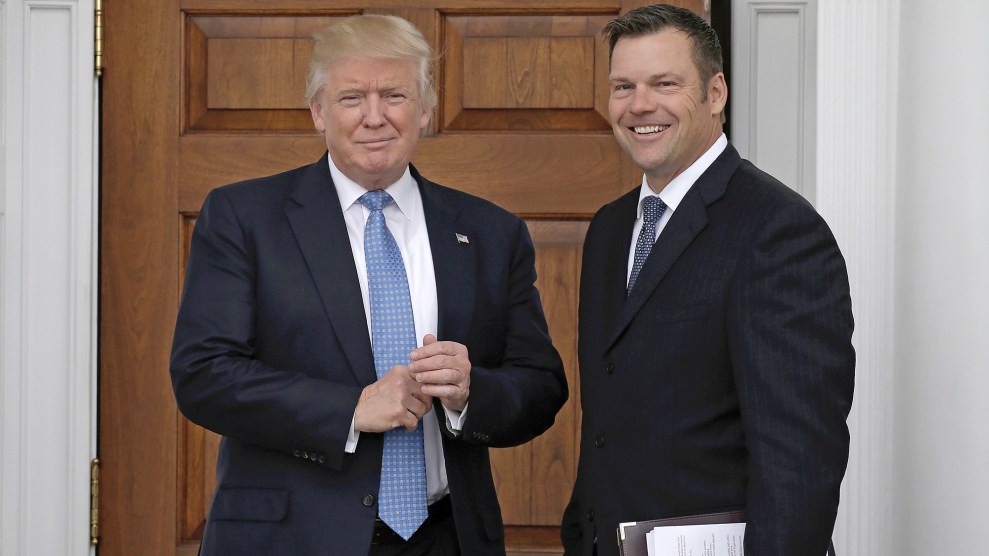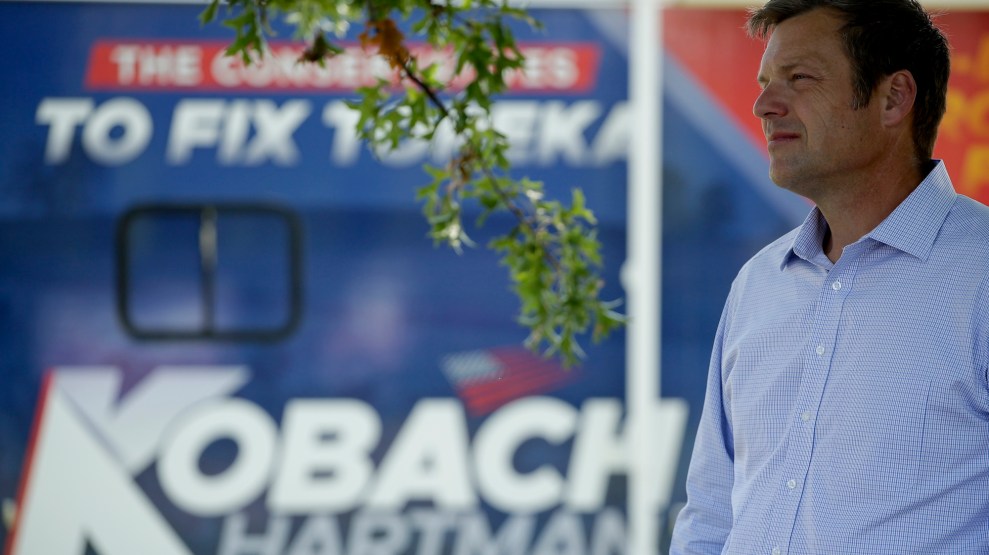
President-elect Donald Trump and Kansas Secretary of State Kris Kobach meet in November 2016 at Trump's golf course in Bedminster Township, New Jersey. Peter Foley/ZUMA
Kris Kobach, the country’s most prominent champion of anti-immigrant policies and restrictive voting laws, became the Republican nominee for Kansas governor on Tuesday night, a week after election day left the race too close to call.
The counting of mail-in and provisional ballots in one of the closest races in the state’s history only added to Kobach’s slim lead over incumbent Gov. Jeff Colyer. On Tuesday evening, Colyer conceded, ending speculation that the close primary would lead to a recount or legal battle.
Kobach’s nomination could move deep-red Kansas even farther to the right—or it could turn off enough moderate Republicans for Kansas to do the unthinkable and elect a Democratic governor. Kobach, Kansas’ secretary of state, is a divisive and deeply conservative politician. Yet he was able to consolidate the party’s conservative base and win with a plurality of the vote. He got a last-minute boost from President Donald Trump, who endorsed him the day before the election. Meanwhile, Colyer, who tried to cater to moderates as well as conservatives, split the majority of the votes with other more moderate candidates vying for the party’s nomination.
Kansas Republicans have grown increasingly divided between moderates and arch-conservatives like Kobach, leaving an opening for his defeat in November. The former Republican governor, Sam Brownback, left the party in disarray by ushering in extreme tax cuts, vetoing a Medicaid expansion, and bringing the state to the brink of a constitutional crisis in a showdown with the state supreme court—all over the objections of moderate Republicans. In the final year of Brownback’s administration, he presided over a legislature that, though controlled by Republicans, was actively trying to undo his legacy and overrode his veto to raise some of the taxes he had cut. Brownback left office in January to join the Trump administration as its ambassador-at-large for international religious freedom, and Colyer succeeded him.
The GOP moderates who battled Brownback have no love for Kobach, who ran as a Brownback-style Republican but with the addition of Trump’s staunch anti-immigration agenda. He campaigned on reinstating Brownback’s most extreme tax cuts and promised to slash spending in order to balance the budget. But Brownback’s cuts have grown increasingly unpopular as they forced the state to trim its budget for schools, roads, and bridges. “It is time for a change,” Kobach told the New York Times recently. “But the time for a change doesn’t have to be in a leftward direction.”
Kobach would also bring Trump’s anti-immigrant crusade to the governor’s mansion. Kobach rose to national prominence as the architect of Arizona’s extreme anti-immigrant bill, SB1070, in 2010, as well as similar legislation in Alabama and in multiple cities, which generally failed to withstand legal challenges. As secretary of state, Kobach pushed a voter ID law that required documentary proof of citizenship in order to vote. Kobach humiliated himself earlier this year when he defended that law in court; not only did he lose, but his team made so many basic legal errors that the judge ordered him to take six hours of continuing legal education on how to present evidence at trial.
But Kobach’s reputation as a foe of voter fraud (though studies show the incidence of fraud is exceedingly rare) led him into Trump’s inner circle. Last year, Trump made him vice-chair of the president’s commission on election integrity, which Trump convened following his unfounded assertion that millions of people had voted illegally in the 2016 election. In January, Trump disbanded the commission, which was under siege from multiple lawsuits from government watchdogs and voting rights advocates. Documents released earlier this month show that Kobach and the other voter fraud alarmists on the commission were trying to document the threat of voter fraud even though they’d found no evidence.
With Kobach’s nomination, Democrats see an opportunity to win the Kansas governorship. They also hope that opposition to Kobach and Trump could supercharge Democratic turnout in November and help them win two congressional seats in the state. Republicans feared that outcome, and the Republican Governors Association lobbied Trump in vain not to endorse Kobach.
But Democrats have their own problems that could tank their prospects in November, most notably a spoiler campaign from independent Greg Orman. A former independent candidate for the US Senate whom Democrats rallied around in 2014, Orman has infuriated the party this year by self-funding a gubernatorial campaign that could siphon enough votes from the Democratic nominee to make Kobach the next governor.












